- Home
- Laurence Yep
City of Death Page 7
City of Death Read online
Page 7
Kaccap and his squad, who were waiting outside, realized it too as they fell in around them. As they marched along, they kept casting curious glances at Kles and his companions. And Kaccap looked uneasy over the way he had mocked Kles.
As they walked back the way they had come, griffins made way and bowed deep, fluttering their wings with a grand flourish.
It made Bayang smile to see how Kles lifted his head proudly as he flew alongside the Keeper’s head and answered more of her questions about their travels.
There’ll be no living with the griffin now. With a smile, Bayang turned to say something to Leech, but he looked away quickly, even falling back several paces as if he were avoiding her.
Maybe it was too much to hope that they had overcome their bloody past.
When they reached the entrance, it took her a moment to realize that the rigid shapes were not more stalactites but griffins standing rigidly at attention. The armor of these griffins was so plain that Kaccap’s patrol seemed like peacocks in comparison. The steel of the new griffins seemed plain from the greaves and armbands protecting their limbs to the discs covering their chests. It was only when she got closer that she noticed that the steel was engraved with the silver likeness of some emperor or empress. Others had designs like lightning bolts or axes. Bayang guessed they were honors given after some great deed.
“I’ve ordered a company of my own guards to escort you, Lady Scirye,” the Keeper explained with a gesture of her paw. “Everyone at court will see that the Tarkär Eyrie holds you in high esteem.”
Would their new escort be any easier on Kles than Kaccap? Scirye wondered, but she bowed her head. “I thank you, Keeper.”
The Keeper engulfed Scirye’s hand in her large paw. “Come back in happier times, lady, and I will tell you stories about your father when he was your age.”
Scirye bowed. “I would like that, Keeper. Thank you.”
The Keeper released Scirye and motioned for Kles to rise into the air to the level of her eyes. It was another mark of respect, for instead of talking down to Kles as if he were a mere underling, she was treating him as if they were equals. “I know you should be at the vanguard, Klestetstse, but I hope you’ll indulge me.”
Kles dipped his head low. “Anything, Keeper.”
Bringing her paw up underneath him, the Keeper carried him over to a guard wearing a golden torque and set the stunned Kles upon the guard’s back. “Let Captain Warpamo lead while you ride with your lady upon one of my guards,” the Keeper said. “She and your friends will need all your wisdom and skill when you arrive at court. And you won’t be at your best if you fly under your own power all the way there.”
Had the Keeper watched their arrival? Bayang asked herself. Perhaps, as she said, Kles did have a special place in her affections.
As she and her friends mounted some of the other dragons, Bayang stole a glance at Kaccap and his squad. They were positively goggle-eyed now and their beaks were open in amazement.
Well, Bayang thought with some satisfaction, that should make the bullies think twice before they pick on another lap griffin again.
“I have no gift of prophecy,” the Keeper said, “and yet I know you have a difficult journey ahead of you, Klestetstse. Keep your lady and the world safe.”
Kles swallowed as he sat on the saddle before Scirye. “I will, Keeper.”
The elderly griffin waved good-bye to them as they rose into the air and eased through the entrance and out into the open. More squads were streaming out of separate openings and forming about them like a shell protecting the seeds at the center until they were surrounded in a globe of the finest griffin warriors.
And then they were off to Bactra, where poisonous court intrigues very well might make it the deadliest place they had ever faced.
15
Scirye
True to his word, Kles rode with Scirye, sitting just before the pommel of the saddle. She rose slightly in the stirrups, knees bent, shoulders straight, head up, and Captain Warpamo twisted his head and gave her an approving nod. There was no bit to the bridle, unlike a horse’s. This way the griffin could speak clearly. “You’ve ridden griffins before, lady.”
Koko, of course, was more interested in the silver decorating his griffin’s saddle, fingering it critically. “I bet this is almost pure.”
“And it had better all be still on there when we arrive,” Bayang warned the badger.
“Hey,” Koko snapped. “Some folks collect postcards when they travel. Can I help it if I’ve got better taste than most?” But he put his paws upon the pommel.
“What do you think is going to happen to us?” Leech asked Kles.
The lap griffin waved a claw. “I think the Keeper is right. This is a way of striking at the princess. These petty spites happen all the time. They wouldn’t dare to actually prosecute my lady or her friends. We should be able to prove our innocence quickly enough, and perhaps we’ll even be able to obtain some help when they hear our tale.”
With Kles pressed against her, Scirye could feel how excited he grew with each mile. He twisted his head from side to side as he gazed down at the rolling landscape below, which seemed to have as many mountains and hills as flatlands.
Just as in the eyrie valleys, the fields below were also lying fallow and the orchards bare of leaves. Whether they were hillside terraces or level fields, the land was well tended and orderly. The fences and low walls made the earth seem like the milky-white pieces of giant mosaic that spread from horizon to horizon.
Kles waved a paw to indicate a great canal, now frozen, from which many smaller channels radiated across the landscape. There was such an intricate network of irrigation canals shimmering in the sun that Bactra seemed surrounded by a lace of fine golden threads.
“Centuries ago this was just desert,” he said. “But the Kushans transformed it into the richest farmlands in the world. They built hundreds of underground aqueducts that bring water down from the mountains in addition to what the rivers supply. And then they constructed thousands of miles of irrigation canals and ditches to carry that water to the fields and orchards.”
It was the vastness of the waterworks, which stretched all the way to the horizon, that impressed Scirye—and she felt a flash of pride at how her ancestors had transformed this barren land into this paradise. Where there had once only been sand dunes there were now snug little homesteads scattered about like buttons on a snowy quilt, the smoke rising from their chimneys like stray threads. And the farther they went, the more homes they saw until they clumped together into whole villages and towns.
Leech looked over the side. “Is that the Silk Road?”
Below them, a truck chugged past a caravan of plodding camels. It shimmered in the sunlight as if it were decorated with as many little mirrors and sequins as Māka’s wagon.
Passing traffic had worn away the snow to reveal modern asphalt.
“The Silk Road is a term used for many routes across the land and sea,” Kles explained. When he saw the boy’s disappointment, he added, “But many roads follow the ancient tracks, so perhaps that was part of the Silk Road once.”
“But why use a camel when you got a truck?” Koko asked.
“People need supplies even in the winter,” Kles said, “when the snows have made it impossible for trucks to use roads.”
Kles’s small body was restless with happiness as he pointed out some landmark. After the first dozen, Scirye barely heard the litany of temples and bridges and historic forts, for she couldn’t control her increasing unease. She didn’t share Kles’s confidence that her family’s enemies would drop whatever charges had been made. Perhaps the Keeper had done too good a job restoring his pride.
There was no abrupt end between the countryside and the city. Rather, the fields and orchards became fewer and the number of buildings and roads increased, and so did the traffic. There were now as many glittering cars and trucks as there were mules and camels—all of them following a train of elepha
nts outfitted in cloth of scarlet and gold, little huts called howdahs swaying on their backs—perhaps the entourage of royalty from India.
And even the sky became more crowded. Griffins of all sorts passed back and forth, carrying packages or passengers. The majority of the escort closed around them in a protective globe while others flew on all sides making sure their passage was clear.
“Make way, make way for the prince of the Khmers,” chattered a flying monkey. Behind him came a palanquin carried by dozens of monkeys. Little bits of mirror and rhinestone festooned the brightly colored, complex designs of its sides, and little tendrils of smoke seeped from the enclosed box as if the prince were trying to keep warm with a brazier of coals.
Captain Warpamo narrowed his eyes, but before he could speak, Kles called in a voice that was both commanding and loud from such a tiny frame. “You make way! We are on the emperor’s business.”
The monkey’s broad mouth drew up in a scowl but then he inclined his head toward the palanquin as if his master was speaking in a low voice. The next moment, he and the other flying monkeys descended lower to let them pass overhead.
The only time their griffin guards veered was to make room as a giant roc with wings as long as a city block began to descend to the airport with twenty or so passengers clinging to the netlike harness fastened around its body. The wind from its flapping wings threw even their mounts a bit off course.
Leech craned his neck to look down at the hangars that stood on either side of the concrete runway. “Maybe Roland’s airplane is down there.”
Bayang nodded. “We’ll ask Scirye’s father to make inquiries.”
Finally Kles rose on his hind legs and spread his wings out as he crowed, “Now behold, Bactra, the Mother of Cities. People have lived here for four thousand years. When Paris was just a village of huts in the middle of an island, Bactra was already a city famous for its schools and temples.”
Though she had been born in Bactra, Scirye had left the city when she had been very young, so her actual memories of it were fuzzy. She gazed down at the blocks of two- and three-story buildings that spread out like a grid from the main highway. Their walls shone pink and pale orange and peach in color. Sunrise colors, Scirye thought.
The roofs were all flat with wooden lattices running around the edge to provide privacy, so the city resembled a fleet of rafts floating above the avenues.
“When the summer’s hot, families spend their days and even their nights on the roofs,” Kles said. “People think of them as outdoor living rooms.”
Even now, despite the cold, Scirye saw people gathered around large cylindrical clay stoves, cooking their meals behind the privacy of lattice walls. Others were tending some of the many dove sheds scattered across the rooftops.
“The roofs are different from San Francisco,” Leech said, disappointed, “but the buildings themselves look pretty modern. I thought you said Bactra has been around for centuries?”
“That’s because this is New Bactra,” Kles explained. “Old Bactra was originally an oasis between two rivers, and as people settled there, it spread across the area between the two rivers.” He pointed to a cream-colored smudge against the mountains to the south. “But late in the last century, King Kanishka IX built the dam that ensured a steady source of water throughout the year. And the city spilled over the banks into the surrounding countryside.”
Ahead of them, factories and mills lined the right bank of a river, their tall smokestacks pouring smoke and steam upward and adding to the golden haze of the afternoon.
They passed directly over what must have been a steel mill, where sweaty trolls—looking like children from this height—moved about with steel beams while elephants pushed along hoppers of coal and iron ore.
Gaudy cars, trucks, and three-wheeled jitneys shared the road with camels, donkeys, and horses, flowing back and forth over a half-dozen bridges. And on the river a one-armed triton set his back against a loaded ferry to push it to the other bank.
“The river below,” Kles said, “marks the eastern boundary of the Old Bactra just as the Bactra River marks the western side.”
Scirye felt both a thrill and a little dread as they flew over the wall of tan-colored blocks that stood on the left bank. Long colorful banners fluttered from the spires of the East Gate towers, and they all gave a gasp, even Scirye. Kles had called Bactra the jewel of Asia, but it was more like a treasure chest of jewels had spilled over the land.
Brightly colored temples and shops squeezed in on either side of ancient mansions. And there were as many types and periods of architecture as there were people from Kushan’s long history: a Hindu temple covered in statues stood next to a small open-air Greek theater with marble columns pale as ivory, shops in the rounded shape of tents from the northern steppes but with golden domes squeezed a scarlet and green Chinese pagoda from either side. The glazed tiles on the walls of the government buildings and universities made them look more like boxes decorated with emerald and sapphire chips.
“We’re passing over the Krītam now,” Kles said. “That’s what Bactrans call the old bazaar, but it actually means ‘amusement’ in the Old Tongue. The area is said to be even older than the citadel.”
The Kushan Empire spanned a vast amount of territory as well as time so that Kushan and Sogdian, Persian and Chinese, Indian and Mongol citizens surged through the narrow lanes, competing with honking cars, elephants, camels, and donkeys. Even the trolls carrying sedan chairs had trouble making headway through the crowds.
Koko scratched his head. “How do folks keep from getting lost? I haven’t seen one straight street yet.” The roads kinked to the left and then to the right in what seemed like random patterns. And in some places the houses’ upper stories thrust out over the street, hiding humans, creatures, and vehicles alike.
Kles shrugged. “There was never any real plan for the original city. It just grew. But you’ll still find streets of shops dedicated to one craft. The silversmiths will be in one area, the cobblers in another.” The griffin pointed a claw at a long, winding path of shops with shining silver plates and vases hanging over the doorways in place of signs. “There’s the street of the silversmiths.” Scirye thought she could almost hear the tink-tink-tink of the silversmiths’ tiny hammers. “And look, over there, it’s the street of the weavers.” He indicated another narrow road where the shops had carpets with elaborate designs. It seemed that every guild occupied a street in the Old City.
The noise level too became as dense as the buildings and the traffic, the voices of humans and animals surging upward in a tide of sound so that Kles had to speak louder. The noise didn’t diminish even as they passed over a district of large mansions, all of them in different styles. The homes with fluted marble columns reminded Scirye of Greece, while the blue-and-green-tiled buildings seemed to belong to Persia. There were red-lacquered Chinese houses with green tiles next to sandstone buildings with carvings of Indian jungles. All the many different groups that made up the Kushan Empire were represented here.
Kles rose on his hind legs, waving a forepaw ahead of them. “And there is the palace.”
The palace occupied the citadel, a tall hill that formed part of the city’s western wall on the right bank of the Bactra River. The palace’s buildings spilled over the broad hilltop, resembling carvings of fine aged ivory and stood in contrast to the newer homes that had spread out from the left bank below.
For four thousand years, the rulers of Bactra had occupied the citadel—though twenty-two hundred years ago, Alexander the Great and the generals who succeeded him had rebuilt the buildings like the ones at home. And when the Kushans had taken over two centuries later, they had kept them intact, but the friezes on the front were of Kushan gods in a mixture not only of Kushan but Greek, Indian, and Persian costumes as well.
Suddenly gun ports flew open all along the steep slopes and the muzzles of cannons and machine guns swung up to aim at them. Scirye realized then that the palace was more t
han just the top of the hill: it was the hill. Over the centuries humans had hollowed out the hill just as Kles’s clan had carved out the insides of their mountain. Emperor Kanishka XII’s home was as much a fort as it was a palace.
Then large portals opened like the yawning mouths of giants, and a hundred war griffins swarmed into the air.
They swept skyward, directly toward them.
16
Bayang
Captain Warpamo stiffened and he waved his paw tensely. “Skirmishers out.” And a dozen riderless griffins shot downward to form a screen while thirty more riderless griffins separated into a roughly conical formation in front of the main party.
The bronze helmets of the human riders glittered in the sunlight. Their uniforms were a dazzling white with blood-red piping. The pennants of the riders’ lances fluttered bravely in the wind.
Kles clacked his beak together angrily. “See the wolf insignia on their helmets? It’s the the Wolf Guard, the personal regiment of the vizier.”
“Is that bad?” Koko asked nervously.
“It’s not good,” Kles said. “The vizier leads the conservatives at court. They call themselves the Axe Bearers after the sacred symbols of the Kushans—though regular folk just call them the Choppers.
“Long ago, my lady’s ancestors called themselves the People of the Moon, and it’s said that Mao the Moon god gave the two-crescent-bladed axes to them to help them flee the Huns. The axes’ glow led my lady’s ancestors through the many dangers of that long trek and finally to safe pastures. Since then they’ve become a symbol of the imperial authority. If the Bearers had their way, they would turn the clock back eighteen centuries to what they insist were our glory days. But my lady’s parents belong to the reform faction that wants to modernize the empire and forge new economic and cultural links to the outside world.”

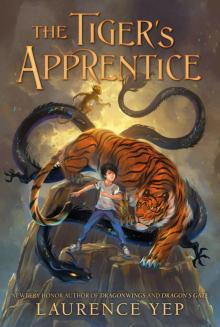 The Tiger's Apprentice
The Tiger's Apprentice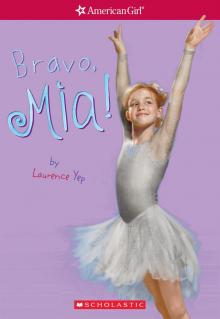 Bravo, Mia
Bravo, Mia STAR TREK: TOS #22 - Shadow Lord
STAR TREK: TOS #22 - Shadow Lord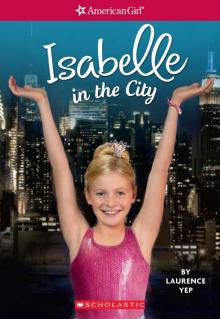 Isabelle in the City
Isabelle in the City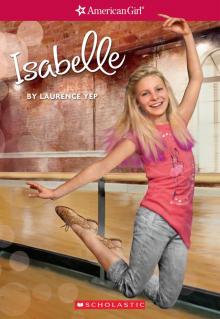 Isabelle
Isabelle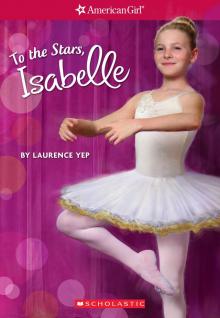 To the Stars, Isabelle
To the Stars, Isabelle Designs by Isabelle
Designs by Isabelle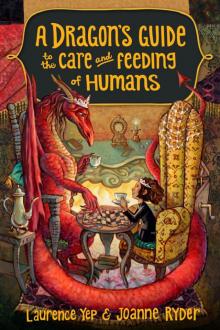 A Dragon's Guide to the Care and Feeding of Humans
A Dragon's Guide to the Care and Feeding of Humans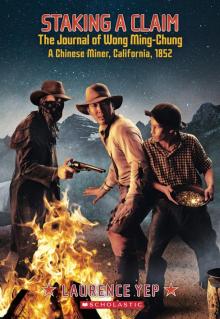 Staking a Claim
Staking a Claim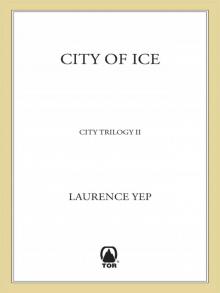 City of Ice
City of Ice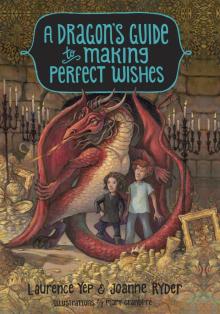 A Dragon's Guide to Making Perfect Wishes
A Dragon's Guide to Making Perfect Wishes City of Death
City of Death